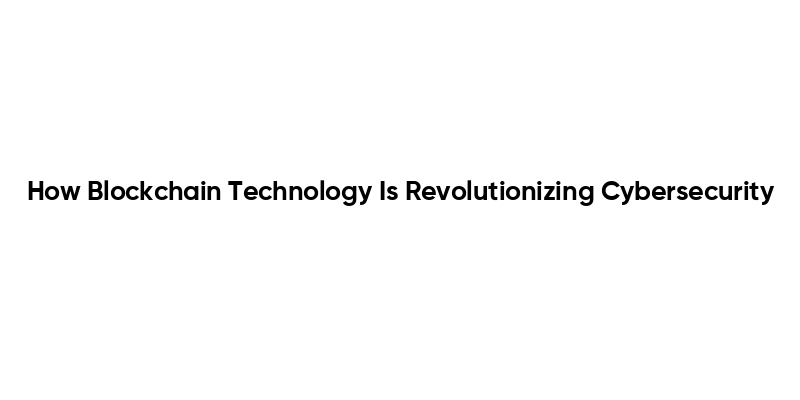In an era where cyber threats are becoming increasingly sophisticated, how blockchain technology is revolutionizing cybersecurity has emerged as a pivotal topic. Blockchain, with its decentralized and immutable nature, offers innovative solutions to combat the growing challenges in data security. By leveraging cryptographic techniques and distributed ledgers, blockchain technology not only enhances the integrity of data but also provides a transparent framework for secure transactions. This article delves into the transformative impact of blockchain on cybersecurity, highlighting its potential to redefine how we protect sensitive information.
As you continue reading, you will uncover the key features of blockchain that make it a game-changer in the cybersecurity landscape. We will explore how its decentralized architecture mitigates risks associated with centralized data storage, making it significantly harder for cybercriminals to execute attacks. Additionally, we will discuss real-world applications of blockchain in cybersecurity, showcasing successful implementations that have fortified organizations against breaches and fraud.
Furthermore, this article will address the challenges and limitations of integrating blockchain technology into existing cybersecurity frameworks. By understanding both the advantages and potential hurdles, you will gain a comprehensive perspective on the future of cybersecurity in a blockchain-driven world. Join us on this enlightening journey to discover how blockchain technology is not just a trend, but a revolutionary force reshaping the cybersecurity landscape.
Enhanced Data Integrity
One of the most significant advantages of blockchain technology in cybersecurity is its ability to enhance data integrity. Blockchain operates on a decentralized ledger system, where each transaction is recorded in a block and linked to the previous one. This structure makes it nearly impossible to alter any information without the consensus of the network. As a result, organizations can ensure that their data remains accurate and unaltered, which is crucial for maintaining trust in digital transactions.
Moreover, the use of cryptographic hashing in blockchain ensures that any attempt to modify data will be easily detectable. This feature is particularly beneficial for industries that require stringent data integrity, such as finance and healthcare. By leveraging blockchain, organizations can significantly reduce the risk of data breaches and unauthorized access, thereby enhancing their overall cybersecurity posture.
Decentralized Identity Management
Decentralized identity management is another area where blockchain technology is making waves in cybersecurity. Traditional identity management systems are often centralized, making them vulnerable to attacks and data breaches. In contrast, blockchain allows individuals to control their own identities through decentralized identifiers (DIDs). This means that users can manage their personal information without relying on a central authority, reducing the risk of identity theft.
With blockchain-based identity solutions, users can selectively share their information with service providers, ensuring that only the necessary data is disclosed. This not only enhances privacy but also empowers users to take control of their digital identities. As organizations increasingly adopt decentralized identity solutions, the potential for reducing fraud and enhancing security in online transactions becomes more pronounced.
Smart Contracts for Automated Security Protocols
Smart contracts are self-executing contracts with the terms of the agreement directly written into code. In the realm of cybersecurity, smart contracts can automate security protocols, ensuring that specific conditions are met before any action is taken. This automation reduces the likelihood of human error, which is often a significant factor in security breaches.
For instance, a smart contract could automatically revoke access to sensitive data if certain security parameters are not met, such as failed authentication attempts. By implementing smart contracts, organizations can create a more robust security framework that responds dynamically to potential threats. This capability not only enhances security but also streamlines operations, allowing organizations to focus on their core business activities.
Improved Threat Detection and Response
Blockchain technology can significantly improve threat detection and response mechanisms in cybersecurity. By utilizing a distributed ledger, organizations can share threat intelligence in real-time across the network. This collaborative approach enables faster identification of potential threats and vulnerabilities, allowing organizations to respond more effectively.
Additionally, the transparency of blockchain allows for better tracking of security incidents. Each transaction or event is recorded on the blockchain, providing a comprehensive audit trail that can be analyzed for patterns and anomalies. This data-driven approach to threat detection not only enhances security but also aids in compliance with regulatory requirements.
Resilience Against DDoS Attacks
Distributed Denial of Service (DDoS) attacks are a significant threat to online services, often leading to downtime and financial losses. Blockchain technology offers a unique solution to this problem by decentralizing the infrastructure. Instead of relying on a single server, blockchain distributes data across multiple nodes, making it more resilient to DDoS attacks.
In a blockchain network, even if some nodes are targeted and taken offline, the remaining nodes can continue to operate, ensuring that services remain available. This resilience is crucial for businesses that rely on continuous online presence. By adopting blockchain technology, organizations can enhance their defenses against DDoS attacks, ensuring better uptime and reliability for their services.
| Aspect | Description |
|---|---|
| Decentralization | Blockchain operates on a decentralized network, reducing the risk of a single point of failure and making it harder for attackers to compromise the system. |
| Data Integrity | Each transaction on the blockchain is cryptographically secured and linked to the previous one, ensuring that data cannot be altered without detection. |
| Transparency | Blockchain provides a transparent ledger that allows all participants to view transactions, enhancing accountability and trust among users. |
| Authentication | Blockchain technology enables secure identity verification through cryptographic keys, reducing the risk of identity theft and fraud. |
| Smart Contracts | Smart contracts automate and enforce agreements without intermediaries, minimizing the risk of human error and enhancing security in transactions. |
| Resilience Against Attacks | The distributed nature of blockchain makes it more resilient against DDoS attacks and other cyber threats, as there is no central server to target. |
| Auditability | Blockchain’s immutable records provide a clear audit trail, making it easier to track and investigate security incidents. |



